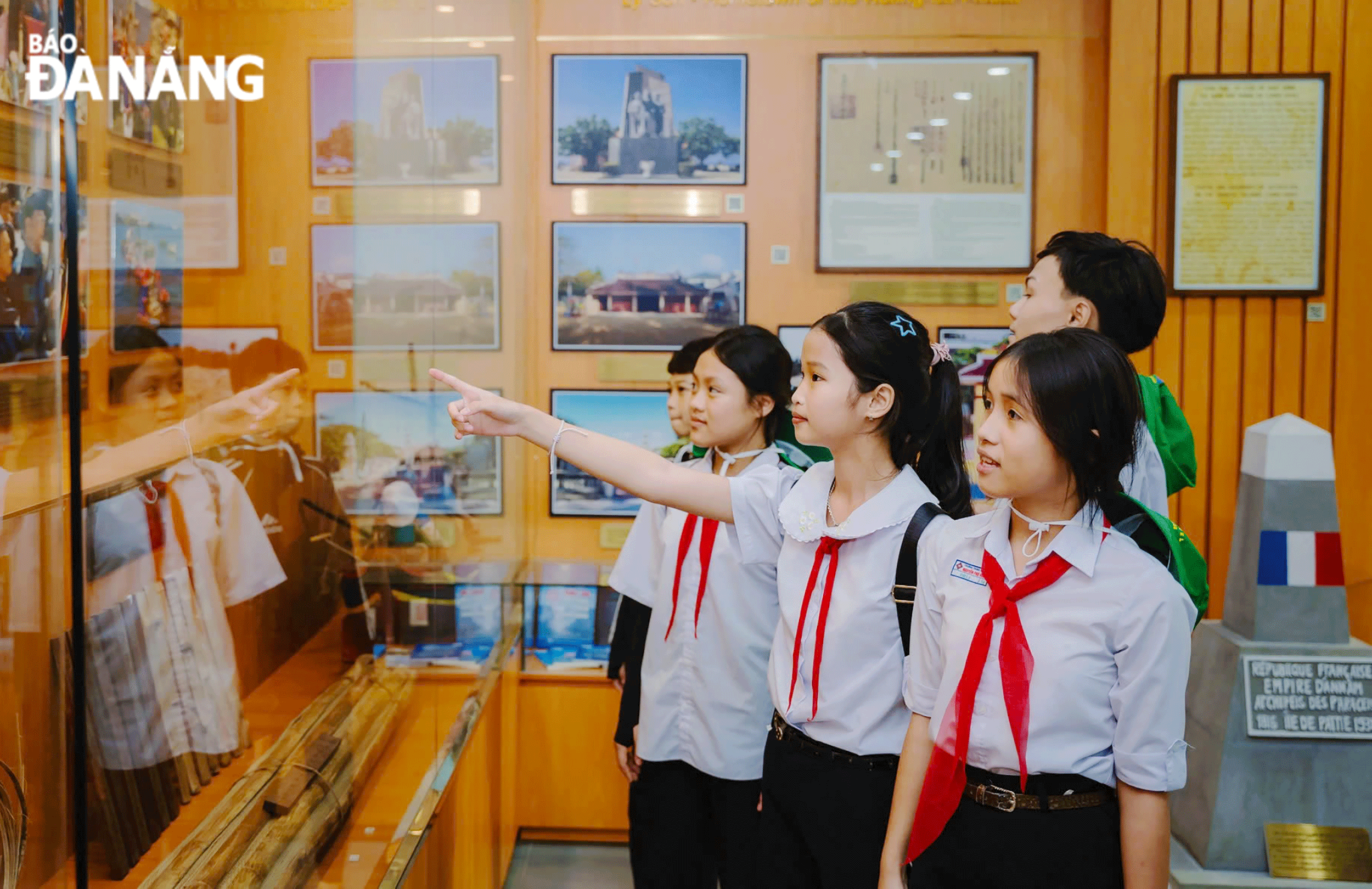Flexible organisation of teaching and learning for local education subject
Local Education is a compulsory subject in the 2018 General Education Programme, aiming to provide pupils with knowledge about their hometown and nurture a love for their homeland. Recognizing its importance, schools and educational institutions have enhanced teaching methods and flexibly organized extracurricular activities to equip pupils with fundamental knowledge about their locality.
 |
| Pupils in Hoa Vang District participate in traditional education activities at the Hoang Sa Exhibition House. Photo: K. Nguyen |
Efforts to educate pupils about local history and traditions are a significant focus of the Department of Education and Training. These activities are incorporated into both the main curriculum and extracurricular sessions. During the 2023–2024 school year, the Department advised the Da Nang’s People’s Committee to compile, evaluate, and submit local education materials for grades 4, 8, and 11 to the Ministry of Education and Training for approval. The materials are designed to integrate practical knowledge and applications. At present, most grade levels have local education textbooks, which schools have actively integrated into their teaching plans.
In primary schools, local education is taught as an integrated part of other subjects, while junior and senior high schools allocate one period per week for the subject. Teaching methods are adjusted to ensure alignment with curriculum requirements and are delivered in various formats, such as thematic lessons, real-life experiential learning, dramatization, and project-based activities. Schools regularly organize field trips to museums, exhibition houses, historical and cultural sites, and traditional festivals to deepen pupils’ social knowledge and foster patriotism among young generations.
Schools in the city have approached the teaching of the Local Education subject with flexibility and creativity. For instance, in Thanh Khe District, local education materials are distributed to schools, shared with parents, and made publicly accessible via school websites. For Grade 9, during the 2024–2025 school year, schools strive to teach at least two themes to prepare pupils for their first-semester assessments.
Ms. Dinh Thi Diep Tung, Principal of Nguyen Trai Junior High School, shared that the Grade 9 curriculum includes six themes, offering pupils basic knowledge about the city’s history, geography, culture, economy, and environment. "As soon as the materials were available, we developed an educational plan and instructed subject teachers to deliver lessons scientifically and effectively. So far, our Grade 9 pupils have completed two themes: ‘The History of Da Nang from the Early 20th Century to Present’ and ‘Hoang Sa Archipelago.’ Activities are conducted both within and outside school premises, combining field trips, club activities, and practical experiences to help pupils enhance self-learning and critical thinking skills," she said.
In Hoa Vang District, known for its rich revolutionary tradition and abundance of historical and cultural sites, local education is implemented using diverse models and methods. According to the Department of Education and Training of Hoa Vang District, the Local Education subject in the 2018 General Education Programme comprises 35 periods per year.
During the 2023–2024 school year, preschools, primary schools, and junior high schools in the district organized experiential education activities at historical and cultural sites, attracting nearly 12,000 pupil participants. Schools also integrated local education content into cultural subjects, utilized school facilities and libraries for club activities, and promoted initiatives like the “Building Friendly Schools, Active pupils” campaign to engage pupils in meaningful participation and skill-building.
According to Mr. Bui Van Tieng, a researcher involved in developing local education materials, the content is structured logically across activities: introduction, new knowledge, practice, and application. This approach allows pupils to perform guided tasks and complete learning objectives effectively. "This enables pupils to gain an accurate understanding of the distinctive values of their homeland, instilling pride and a sense of responsibility for preserving and promoting those values," he explained.
“To cultivate future generations of culturally rich, globally integrated Da Nang citizens, the foundation must start early in schools. Therefore, the city needs to prioritize education development as a top investment, beginning with fostering educators who embody cultural excellence. These teachers will serve as role models, inspiring pupils to adopt cultural attitudes and behaviors befitting the future stewards of our nation,” Mr. Tieng emphasised.
Reporting by KHOI NGUYEN - Translating by TRUC VY








